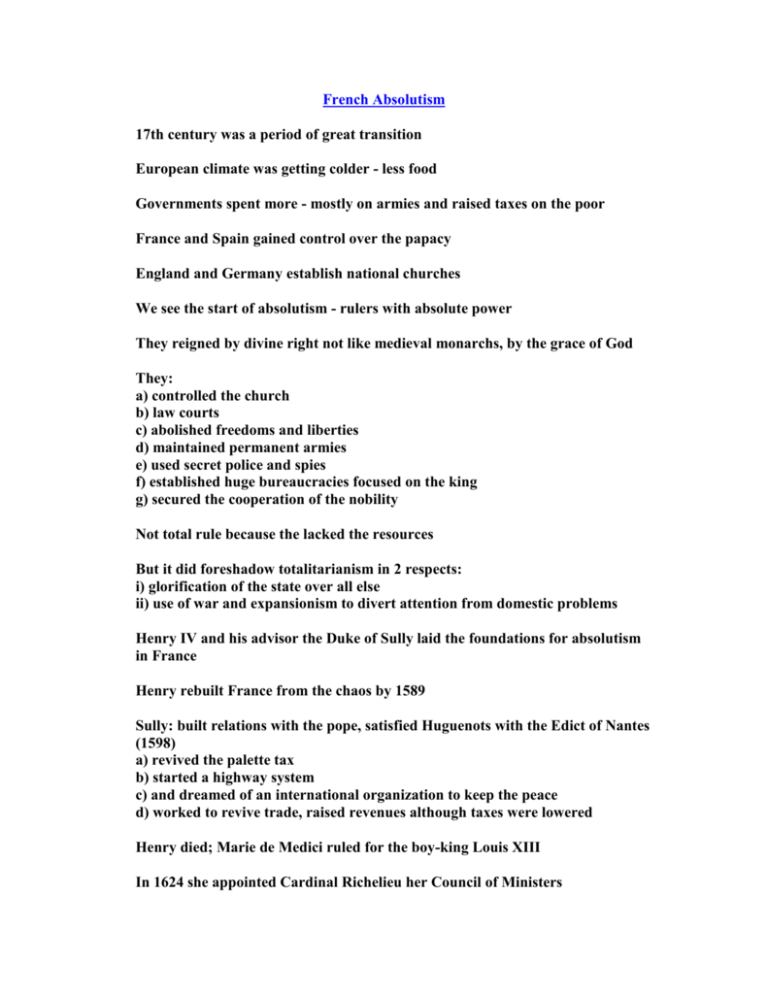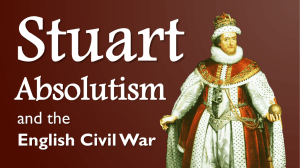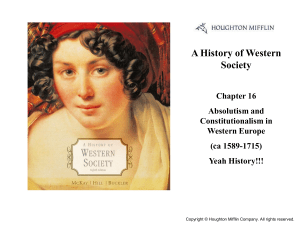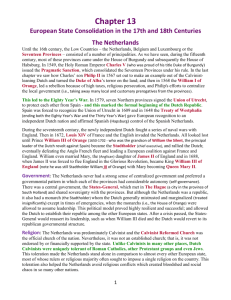French Absolutism
advertisement

French Absolutism 17th century was a period of great transition European climate was getting colder - less food Governments spent more - mostly on armies and raised taxes on the poor France and Spain gained control over the papacy England and Germany establish national churches We see the start of absolutism - rulers with absolute power They reigned by divine right not like medieval monarchs, by the grace of God They: a) controlled the church b) law courts c) abolished freedoms and liberties d) maintained permanent armies e) used secret police and spies f) established huge bureaucracies focused on the king g) secured the cooperation of the nobility Not total rule because the lacked the resources But it did foreshadow totalitarianism in 2 respects: i) glorification of the state over all else ii) use of war and expansionism to divert attention from domestic problems Henry IV and his advisor the Duke of Sully laid the foundations for absolutism in France Henry rebuilt France from the chaos by 1589 Sully: built relations with the pope, satisfied Huguenots with the Edict of Nantes (1598) a) revived the palette tax b) started a highway system c) and dreamed of an international organization to keep the peace d) worked to revive trade, raised revenues although taxes were lowered Henry died; Marie de Medici ruled for the boy-king Louis XIII In 1624 she appointed Cardinal Richelieu her Council of Ministers Richelieu: a) subordinated all offices to the monarchy b) weakened the power of the nobles - destroyed castles and other symbols of independence c) recruited for the army d) supervised tax collection e) checked on nobility - beheaded traitorous nobles like Montmorency f) regulated economic activity g) reshuffled royal council to weaken potential enemies Richelieu’s policy was to weaken the Habsurgs who surrounded France 1631 France joins Sweden in the Thirty Years’ War against the Catholics Richelieu wrote Political Testament which said power is based on revenue French monarchs couldn’t tax at will so they would never have complete control "raison d’etat" - what is done for the state is done for God Set up excellent administrative system - divided France into 32 généralités Richelieu persuaded the king to appoint Jules Mazarin as his successor Richelieu and Louis both died Queen Anne of Austria governs for her son Louis XIV Mazarin continues Richelieu’s policies but leads to a civil war - The Fronde (1648-53) The war was between the king and the nobility - the frondeurs Violence continued for 12 years and had three significant results: a) government would have to compromise with the nobility b) the economy was ruined and would take years to rebuild c) Louis XIV would never forget the trauma Under Louis (Sun King) absolutism reached its height "When Louis sneezed, all Europe caught cold" Reigned for 72 years Many insurrections due to high taxes and grain shortages Temporarily solved finance problems with cooperation of local elites Time known as Age of Magnificance and by Voltaire as the Age of Louis XIV Supposedly had little education but in reality well educated Married Maria Theresa because of a diplomatic arrangement with Spain Had complete control over all classes of society Ruled from Versailles where he required the nobility to reside for several months each year Studied under Mazarin to learn how things work Ruled without political influence from wife and mistress Never called the Estates General Other monarchs imitated Louis and French replaced Latin as the language of the educated But his weakness was always finances He appointed Jean-Baptiste Colbert Controller of Finances Colbert believed the wealth of the country should serve the state He applied the theory of mercantilism to France Mercantilism - government policies for the regulation of economic activities by and for the state Believed France should be self-sufficient - set up industries to replace imports Colbert sent 4,000 people to Canada Marquette and Joliet - Mississippi River La Salle - Louisiana Commercial class prospered while agriculture declined Because of war, bad harvests, deflation of currency, and emigration Colbert’s goals were never attained 1685 Louis revoked the Edict of Nantes Closed schools, destroyed Protestant churches, and exiled those who would not renounce their faith "one king, one law, one faith" The revocation won Louis enormous praise French Classicism Poussin was the greatest classicist painter Rape of the Sabine Women Absolutism and Classicism melded Art glorified the king Lully, Couperin, and Charpentier created great orchestral works Moliere (1622-1673) and Racine (1639-1699) wrote powerful plays on controversial issues as well as well as plays praising the king Les Moliere wrote Tartuffe, which brought him criticism from the church, but he was protected by Louis XIV. Louis XIV’s Wars Kept France at war for 33 of 54 year reign Appointed Marquis de Louvois secretary of State for War Louvois created a professional army A) feed the troops b) an ambulance corp c) standard weapons and uniforms d) rationalized training e) regulated promotion f) state recruits men not nobles 1667 Louis invaded Flanders no success 1672 he invaded Holland but the Dutch saved themselves by flooding their land 1681 he seized Strasbourg and parts of Lorraine 1689 William of Orange - king of England William joined the League of Augsburg, but neither side won Claude Le Peletier, Colbert’s successor devalued the currency and sold offices and titles to the nobility Between 1688-94 bad harvests sent the price of wheat skyrocketing 1694 Lord Pontchartrain imposed the capitation raise money 1701-1713 The War of Spanish Succession a) old territorial disputes b) dynastic question of Spanish throne 1700 Charles II was king of Spain - he was insane Charles died in 1700 and left the throne to the grandson of Louis XIV, Philip of Anjou The Dutch and British refused to accept French control of the Spanish colonies and Netherlands English, Dutch, Austrian and Prussians formed the Grand Alliance Even though the were all fighting the French internal conflicts developed Two soldiers dominated: Eugene, prince of Savoy representing the HRE John Churchill representing England PEACE OF UTRECHT Philip of Anjou remains king of Spain Spain and France must never unite France gave Austria Spanish Netherlands France gave England Nova Scotia, Hudson Bay, Newfoundland France recognizes the Hohenzollern rulers of Prussia Spain gave England Gibraltar Spain gave England -asiento- the rights to the slave trade The Treaty Represented the balance of power principle Saw the decline of Spain Saw the rise of the British Empire Marked the end of French expansionism Spanish Decline No middle class - Jews and Moors gone Agricultural decline Population decline Failure to invest wisely Intellectual isolation (religious reasons) Increase in Dutch and English trade with Americas Americas develop local industries Increasing royal expenditure 1715 Spain a second-rate power Several times the king declares bankruptcy and cancels national debt People dropped out of society or turned to religion High rents and taxes drove peasants off the land Philip IV left control to Count-Duke Olivares Olivares believed in imperialism Imperialism meant conflict with the Dutch and French Constitutionalism France, Prussia, Russia - absolute states England, Holland - constitutional states Constitutionalism is limiting the govt. by law (may be written or unwritten) May be monarchies or Republics This is not democratic (no franchise for all) 1603 James I (Stuart) replaced Elizabeth (Tudor) Believed he was only responsible to God and had control over everything which conflicted with the principle of due process House of Commons governed the royal finances The members of the Commons were better educated than in previous govts. Charles I tried to rule without Parliament and it almost crippled the country Many people believed the Reformation had not gone far enough Wanted to purify the Anglican Church of Catholic influences Most English were Calvinists, most zealous were Puritans James I and Charles I gave the impression of being sympathetic to Catholicism Charles supported archbishop of Canterbury William Laud Laud insisted on complete uniformity with the "Court of High Commission" Wanted to impose on the Scots: a) new Anglican prayer book b) bishoprics Both rejected by the Scots who rebelled Charles was forced to recall Parliament to get funds Parliament was not willing to trust the king with an army Long Parliament sat from 1640-1660 Parliament: a) 1641 Triennial Act - king must summon Parliament every 3 years b) Impeached archbishop Laud c) Abolished the Court of High Commission Charles, fearful of an uprising, agreed The Irish also rebelled and Charles couldn’t stop them Charles recruited army from nobility (Cavaliers) Parliament recruited an army (Roundheads) The English Civil War (1642-9) did not resolve the problem of who would hold the power 1649-1660 is the "Interregnum" Thomas Hobbes Leviathan, sovereignty is derived from the people, the power of the ruler is absolute but not divine - this pleased no one Theoretically, power rested with parliament The army controlled Parliament, Cromwell controlled the "New Model Army" "Protectorate" Cromwell’s rule was a military dictatorship The army prepared a constitution: a) executive power rested with Cromwell and a council of state b) a triennial Parliament c) Parliament can raise taxes Cromwell tore up the document Cromwell: a) divided the country into 12 military districts b) The Instrument of Government gave religious freedom to all, except Catholics c) crushed rebellions in Ireland d) enforced the Navigation Acts (English goods - English ships) e) welcomed Jews The state: a) censored the press b) forbade sport c) closed the theaters Cromwell was an absolutist - died 1658 The Restoration - 1660 Reestablished the monarchy - Charles II Both houses of Parliament were restored Law courts restored Local govt. through Justices of the Peace Test Act of 1673 To enforce religious conformity those who refused to receive the sacraments of the Church of England: a) could not vote b) hold public office c) preach or teach d) attend university e) assemble for meetings CABAL 5 advisors appointed by the king, also members of Parliament: Clifford; Arlington; Buckingham; Ashley-Cooper; Lauderdale Gave rise to ministerial responsibilities Parliament did not give Charles enough money to rule - but acknowledged his divine right For 200,000 pounds, Charles agrees to: a) relax laws against Catholics b) re-catholicize England c) support France against the Dutch policies d) convert to Catholicism The people feared: a) a Catholic dynasty b) hated Louis XIV and absolutism c) hated Catholicism The Commons passed a bill excluded Catholics for the throne Charles dissolved Parliament - the bill never passed James II succeeded his brother James appointed Catholics to high positions - contrary to the Test Act James suspended the law at will and England feared absolutism Wealthy English men offered the throne to James’s Protestant daughter Mary and William He also declared religious freedom for all Two events signaled revolution i) seven bishops were arrested for not complying with the Declaration of Indulgence ii) James’s second wife produced a male heir Triumph of Government The "Glorious Revolution" had very little blood and was the end of divine-right monarchy in England Sir Walpole - created the office of "Prime Minister" and developed the Cabinet as being responsible to the House of Commons William and Mary accepted the throne but recognized the supremacy of Parliament The rights of the people were listed in the Bill of Rights The Bill of Rights Laws were made by parliament and could not be suspended by the Crown Parliament had to be called at least every 3 years The Crown would not interfere with Parliament Judges would be independent No standing army in peace time English monarch must be Protestant Freedom of worship to Protestant dissenters John Locke Second Treatise of Civil Government defended the revolution: a) People set up governments to protect life, liberty, and property b) If government oversteps the bounds then it is tyranny, people have a natural right to revolt The revolution was not democratic Sovereignty rested with Parliament Parliament reflected the Upper Class Created a constitutional monarchy - the age of aristocratic government The Dutch Republic Model for other constitutional states 1581 - 7 provinces of the Union of Utrecht form United Provinces Independence confirmed by Treaty of Westphalia (1648) Led to the "Golden Age" of the Netherlands Power was held by regents in an oligarchy States General handled foreign affairs States General appointed stadholders (representatives) in each province Confederation was a weak collection of separate states Holland (largest navy) dominated Dutch were republicans and Calvinists Upper class and middle class believed in hard work Political success based on economic prosperity *They were tolerant of religion Toleration attracted investment Herring fishing was the cornerstone of their success Profits stimulated shipbuilding Became transporters - not exporters 1602 - Dutch East India Company created, a joint-stock company East and West India Companies became tools of imperialism Amsterdam became the center of trade Bank of Amsterdam was the place with the lowest credit rate and was easiest to attain Highest standard of living in Europe "island of plenty in a sea of wants" Decline began with Peace of Utrecht (1713) after the costly War of Spanish Succession by William of Orange









